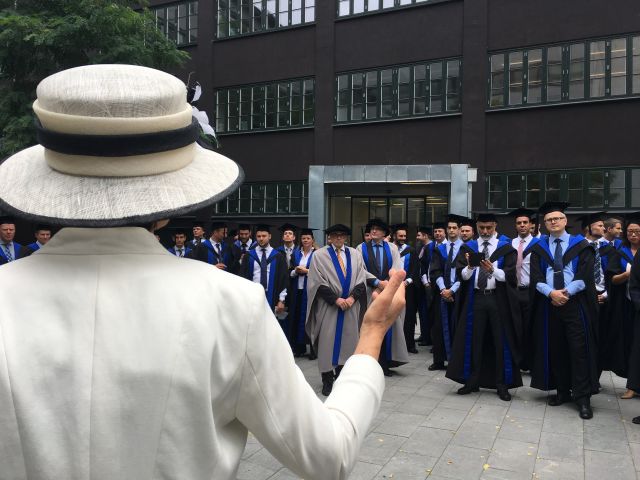Can blockchain technology battle corruption? Yes, CBS research suggests

(Photo: Anne Thora Lykkegaard)
Bribes covered as facilitation fees, and document fraud are part of the ugly truth about how global industries are run, the United Nations claims. Now, CBS research suggests that blockchain technology can help to mitigate corruption in the shipping industry – and elsewhere. But fraudsters and crooks will always find a way, the researchers point out.
A container of fresh-cut roses leaves a port in the far-East bound for a country in the EU. It is accompanied by a physical journal detailing the container’s contents. These journal documents allow for passage through different ports and are stamped by customs authorities.
During the trip, the documents change hands several times, and suddenly, the fresh-cut roses become grafted roses, which are subject to different rules and cheaper tariffs. The quantities, weight, and volumes impacting duties and fees can also be stated incorrectly and approved at various stages of the process.
This is one example of the type of corruption occurring in the shipping industry. And examples like this are what Jonas Hedman, Professor with special responsibilities (MSO) at the Department of Digitalization at CBS, together with three researchers, have investigated and found a potential way to mitigate.

“Corruption is an issue. And it has probably become an even bigger problem with the disruption of the global supply chain following the pandemic, which has increased the price of a shipping container from $2000 to 15,000,” he says and gives another example of corruption in the shipping industry:
“You approach a port, but before you are allowed to enter the port and unload your goods, a local port worker asks you to pay a facilitation fee, which is actually just a bribe. He has a low-paid job that doesn’t cover his cost of living, so that’s a way for him to get by.”
Jonas Hedman’s statement about corruption being an issue is backed by the United Nations. According to them, corruption adds an estimated 10% or so to the cost of doing business globally.
In the scientific article written by Jonas Hedman, Otto Mønsted guest Professor Suprateek Sarker from the University of Virginia, Professor MSO Stefan Henningsson and Assistant Professor Thomas Jensen, both from the Department of Digitalization at CBS, which was published in the Journal of Management Information Systems, a CEO from the shipping industry shares his experience of corruption:
“For many, many years, sailing through the Suez Canal meant paying hundreds of thousands of dollars in addition to the new state-owned flat rate, plus some cigarette cartons and a bottle of whiskey for those who were allowed to drink. This was needed to keep things running.”
But times are changing in the shipping industry. Digitalization and new technologies are gaining a foothold. Including blockchain technology, which is already being used to increase visibility in the sector, for handling documents and connecting various data systems.
And this is where the researchers asked themselves: can blockchain technology work to mitigate corruption in the shipping industry?
Speeding up processes
After having mapped the various types of corruption in the industry, the researchers looked at examples of how blockchain technology is used in the industry. One way is TradeLens, a partnership between Mærsk and the IT company IBM, which deals with about 65% of the global container shipments.
TradeLens offers blockchain technology to support various shipping processes, and according to the scientific article, more than 100 international ports, 10 national customs authorities and 10 international shipping lines use TradeLens.
“The technology supports better information flow and has been shown to have a preventive function. For example, when you handle documents through TradeLens, they cannot be altered. You cannot change or fake the documents unless everyone in that blockchain accepts the changes. Of course, if you file a corrupt document, the document will also remain corrupt throughout the process,” says Jonas Hedman.
Another advantage of using blockchain technology in the shipping industry is that it accelerates processes. Physical documents must be delivered to the port authorities, which requires walking back and forth between various offices and the ship before being ready to ship or unload goods.
“If containers come to a standstill, often it’s because documents are being processed. A lot of time can be saved,” says Jonas Hedman.
Top management has a huge impact
The battle against corruption cannot be won through digital technologies alone, however, Jonas Hedman and the researchers explain in the scientific article.
“There is a chance that regardless of blockchain’s sophistication, fraudsters and crooks will find new ways of corrupting the system or adapting it to their advantage,” they write.
An equally important aspect of fighting corruption involves attitudes towards corruption and how corruption is discussed. Especially at management level.
“Top management has a huge impact on the organization when it comes to corruption. If they condone corruption, that has a social impact on employees. They are role models, you could say,” says Jonas Hedman.
Jonas Hedman is confident that blockchain technology will become more widespread in the shipping industry, and he hopes that the results of the scientific paper can inspire other industries that suffer from corruption in one way or another.
“Hopefully, it will go beyond shipping. Perhaps executives will pick up ideas from the paper when they realize that what they do matters,” he says.





































































































































Comments